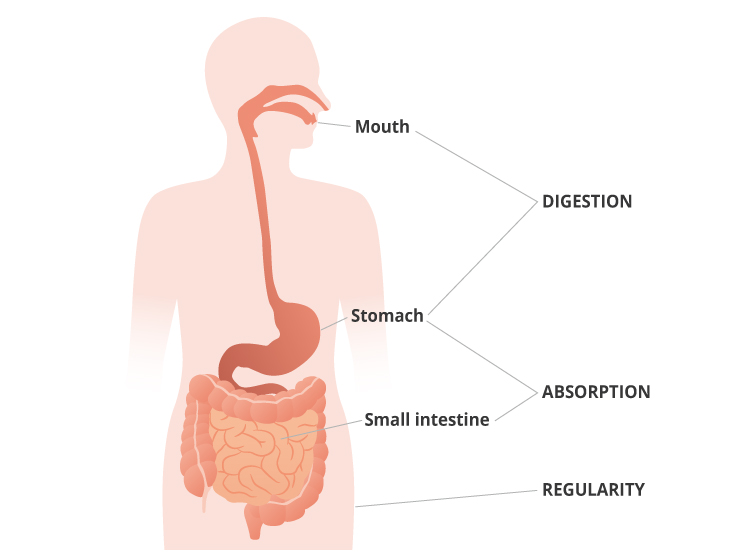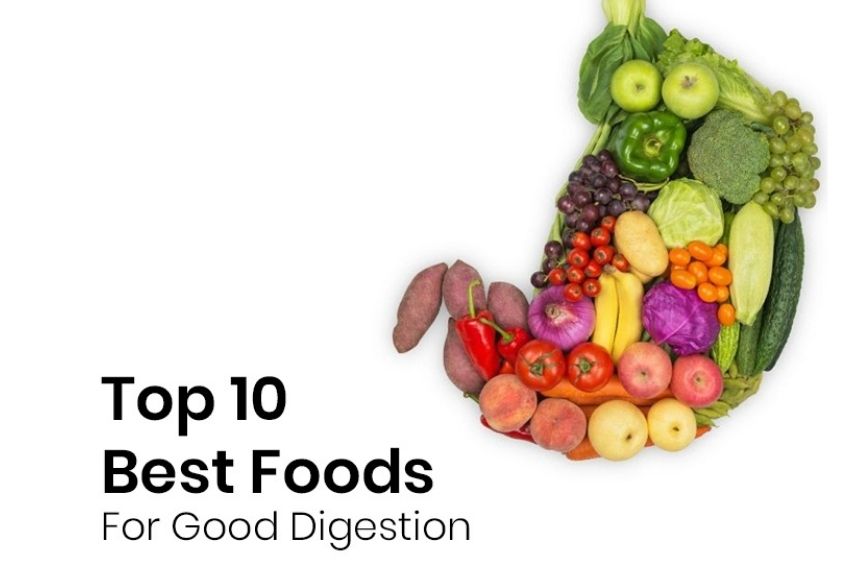The journey to maintaining optimal health starts with the gut. A well-functioning digestive system not only processes the food we eat but also affects our energy levels, mood, and overall well-being. This article dives deep into the world of digestive health, highlighting the vital role of diet and lifestyle in fostering a vibrant, energetic life.
Table of Contents
Understanding Digestive Health
The Digestive Process
The digestive process begins the moment we start eating. When we chew our food, saliva mixes with the food particles, starting the breakdown of carbohydrates. The chewed food then travels down the esophagus to the stomach, where it’s further broken down by stomach acids and enzymes. This mixture moves to the small intestine, where the majority of nutrient absorption occurs, with the help of enzymes produced by the pancreas and bile from the liver. The remaining waste products then move to the large intestine, where water is absorbed, and the waste is eventually expelled from the body.
Signs of a Healthy vs. Unhealthy Digestive System
Healthy Digestive System:
- Regular bowel movements without pain or discomfort.
- Absence of bloating, gas, or indigestion.
- Efficient nutrient absorption, evident through healthy skin, hair, and nails.
- Overall feeling of well-being and energy.
Unhealthy Digestive System:
- Irregular, painful, or difficult bowel movements.
- Frequent bloating, gas, or indigestion.
- Signs of malabsorption, such as fatigue, weak nails, and dull skin.
- Persistent discomfort after eating.
An unhealthy digestive system can be the root of many health issues beyond simple stomach upset. It can lead to chronic conditions such as irritable bowel syndrome (IBS), inflammatory bowel disease (IBD), gastroesophageal reflux disease (GERD), and even contribute to mood disorders through the gut-brain axis.
The Impact of Digestive Health on Daily Life
The state of our digestive health can significantly influence our daily lives. A healthy digestive system contributes to a strong immune system, a balanced mood, and high energy levels. It enables us to absorb the nutrients we need to function optimally. On the other hand, an unhealthy digestive system can lead to nutrient deficiencies, lowered immunity, chronic fatigue, and a decreased quality of life.
Understanding the signs of a healthy versus an unhealthy digestive system allows us to take proactive steps towards maintaining or improving our digestive health. This can include adjusting our diets, incorporating physical activity, and managing stress, all of which play a vital role in our overall digestive well-being.

The Role of Diet in Digestive Health
How Food Affects Digestion
Fiber: One of the most critical dietary components for digestive health is fiber. Found in fruits, vegetables, whole grains, and legumes, fiber aids in maintaining regular bowel movements and prevents constipation. Soluble fiber, in particular, can help manage blood sugar levels and lower cholesterol, while insoluble fiber adds bulk to stool and helps food pass more quickly through the stomach and intestines.
Probiotics: These beneficial bacteria, present in fermented foods like yogurt, kefir, and sauerkraut, contribute to the health of the gut microbiome, the community of microorganisms living in the digestive tract. A balanced microbiome supports immune function, combats harmful bacteria, and plays a crucial role in breaking down food and absorbing nutrients.
Healthy Fats: While excessive fat can slow digestion, healthy fats found in avocados, nuts, seeds, and olive oil are essential for absorbing fat-soluble vitamins (A, D, E, and K) and supporting overall gut health.
Water: Adequate hydration is essential for digestion. Water helps dissolve fats and soluble fiber, allowing these substances to pass through the intestines more easily.
The Impact of Bad Eating Habits
Processed Foods: High in unhealthy fats, sugars, and artificial additives, processed foods can disrupt the balance of the gut microbiome, leading to inflammation and increased permeability of the intestinal lining, a condition often referred to as “leaky gut.”
High-Sugar Diets: Diets heavy in sugar can lead to an overgrowth of yeast in the gut, which can cause bloating, gas, and other digestive discomforts. Additionally, excessive sugar intake can interfere with the body’s ability to absorb nutrients.
Excessive Alcohol: Regular, excessive alcohol consumption can damage the lining of the digestive tract, hinder the absorption of nutrients, and disrupt the balance of beneficial gut bacteria.
Tailoring Diet for Digestive Health
To support digestive health, it’s essential to consume a balanced diet rich in fiber, lean proteins, healthy fats, and a variety of fruits and vegetables. Incorporating fermented foods to introduce beneficial probiotics, and staying hydrated by drinking plenty of water, can further enhance digestive function.
Mindful eating practices, such as chewing food thoroughly and not eating too quickly, can also significantly benefit digestion by facilitating the mechanical breakdown of food and allowing time for the digestive system to process nutrients efficiently.

Top Foods for Boosting Digestive Health
High-fiber Foods
Whole Grains: Foods like oats, quinoa, barley, and whole wheat contain high amounts of fiber, which aids in bowel regularity and prevents constipation. Fiber also acts as a prebiotic, feeding the beneficial bacteria in the gut.
Fruits and Vegetables: Rich in fiber, vitamins, and minerals, fruits and vegetables are cornerstone foods for digestive health. Leafy greens, such as spinach and kale, and fruits like apples, berries, and pears, offer high fiber content and antioxidants that support gut health.
Fermented Foods
Yogurt: A great source of probiotics, yogurt helps increase the number of beneficial bacteria in the gut, improving digestion and immune function. Opt for yogurts with live or active cultures for the best benefits.
Kefir: Similar to yogurt but in a drinkable form, kefir is fermented milk that’s rich in probiotics. It’s particularly beneficial for those with lactose intolerance, as the fermentation process breaks down much of the lactose.
Kimchi and Sauerkraut: These fermented vegetables are not only probiotic-rich but also contain fiber and vitamins. They contribute to a healthy gut microbiome and can aid in digestion.
Lean Proteins
Fish and Poultry: Lean proteins, such as chicken, turkey, and fish, are easier on the digestive system compared to red meats. They provide essential nutrients without putting too much strain on digestion.
Legumes: Beans, lentils, and peas are excellent plant-based sources of protein and are rich in fiber. They can support digestive health by promoting bowel regularity and feeding beneficial gut bacteria.
Antioxidant-rich Fruits and Vegetables
Berries: Strawberries, blueberries, and raspberries are loaded with antioxidants and fiber, promoting a healthy gut and aiding in digestion.
Bell Peppers and Carrots: High in vitamin C and beta-carotene, these vegetables support the immune system and maintain the health of the digestive tract lining.
Other Beneficial Foods
Ginger: Known for its anti-inflammatory properties, ginger can help ease nausea and promote stomach motility, helping to move food through the digestive system more effectively.
Almonds: Rich in fiber, protein, and healthy fats, almonds are beneficial for digestive health. They also contain prebiotic properties that can help feed the beneficial bacteria in the gut.
Incorporating these foods into your diet can lead to significant improvements in digestive health. Remember, variety is key. A diverse diet ensures you’re getting a wide range of nutrients and probiotics to support gut health. Additionally, staying hydrated and adopting healthy eating habits, such as chewing food thoroughly and eating slowly, can further enhance digestive wellness.

Habits to Enhance Digestive Health
Regular Physical Activity
Exercise isn’t just good for your heart and muscles; it’s also beneficial for your digestive system. Regular physical activity helps food move through your digestive tract more efficiently, reducing the risk of constipation. It can also help manage stress, which is known to negatively affect gut health. Aim for at least 30 minutes of moderate exercise most days of the week.
Adequate Hydration
Water is a critical component of healthy digestion. It helps dissolve fats and soluble fiber, allowing these substances to pass through your intestines more easily. Being well-hydrated also ensures that your body can produce enough saliva and stomach acid, both essential for breaking down food. Aim to drink at least 8 glasses of water a day, or more if you’re active or live in a hot climate.
Mindful Eating Practices
How you eat can be just as important as what you eat. Eating too quickly or not chewing your food thoroughly can lead to digestive discomfort and make it harder for your body to absorb nutrients. Try to:
- Sit down for meals: This helps you relax and focus on your food, making it easier to eat slowly and mindfully.
- Chew thoroughly: Breaking your food down into smaller pieces makes it easier for your digestive system to process.
- Listen to your body: Stop eating when you feel full to avoid overburdening your digestive system.
Managing Stress
Chronic stress can wreak havoc on your digestive system, leading to issues like stomach ulcers, diarrhea, constipation, and irritable bowel syndrome (IBS). Finding effective ways to manage stress is essential for maintaining digestive health. Techniques such as deep breathing, meditation, yoga, and regular exercise can all help reduce stress levels.
Avoiding Late-Night Eating
Eating late at night can lead to digestive issues like heartburn and indigestion, as lying down shortly after eating can cause stomach acid to move up into the esophagus. Try to eat your last meal at least 3 hours before bedtime to give your body enough time to digest properly.
Cutting Back on Bad Habits
Smoking, excessive caffeine, and alcohol consumption can all negatively affect your digestive health. Smoking can increase the risk of developing ulcers and gallstones, while too much caffeine and alcohol can cause stomach acid production to spike, leading to heartburn and stomach discomfort.
Incorporating these habits into your daily routine can lead to significant improvements in your digestive health over time. Remember, making small changes gradually is more sustainable and effective than trying to overhaul your lifestyle overnight. By taking steps to improve your digestive health, you’re investing in your overall well-being and quality of life.

Avoiding Foods That Harm Digestive Health
Processed and High-Sugar Foods
Processed foods, often high in added sugars, unhealthy fats, and artificial additives, can disrupt the balance of gut bacteria, leading to inflammation and a compromised gut lining. These foods typically lack fiber, which is essential for healthy digestion and bowel regularity. High-sugar foods can also contribute to overgrowths of yeast in the gut, further disrupting digestive health.
High-Fat Foods
While healthy fats are an essential part of a balanced diet, foods high in saturated and trans fats can slow down the digestive process, making it more difficult for food to move through the digestive tract. This can lead to constipation and, over time, may increase the risk of developing gallstones. Additionally, fatty foods can trigger heartburn in individuals prone to acid reflux.
Foods High in Artificial Additives
Artificial additives, including sweeteners and preservatives, can irritate the digestive tract and disrupt the balance of gut bacteria. Some people may also experience specific sensitivities or intolerances to additives like MSG (monosodium glutamate) or sulfites, leading to digestive discomfort, headaches, and other symptoms.
Dairy Products (for Lactose Intolerant Individuals)
For individuals with lactose intolerance, consuming dairy products can cause symptoms such as bloating, gas, diarrhea, and abdominal pain. This is due to the body’s inability to digest lactose, a sugar found in milk and dairy products. Opting for lactose-free alternatives or plant-based milk and cheese can help avoid these discomforts.
Caffeine and Alcohol
Caffeine can stimulate the digestive system, leading to increased stomach acid production and potentially causing heartburn and indigestion. Similarly, alcohol can irritate the stomach lining, increase acid production, and relax the esophageal sphincter, contributing to acid reflux and heartburn.
Spicy Foods
While many people can tolerate spicy foods without issues, others may find that spicy dishes irritate the digestive tract, leading to heartburn and indigestion. If you notice discomfort after eating spicy foods, it may be helpful to reduce their intake.
Gluten (for Those with Celiac Disease or Gluten Sensitivity)
For individuals with celiac disease or non-celiac gluten sensitivity, consuming gluten—a protein found in wheat, barley, and rye—can lead to serious digestive issues, including abdominal pain, bloating, diarrhea, and damage to the intestinal lining. Following a strict gluten-free diet is essential for managing these conditions.

Meal Planning for Optimal Digestive Health
Tips for Incorporating Beneficial Foods into Your Diet
1. Prioritize Fiber: Aim to include a source of fiber in every meal to help maintain regular bowel movements and feed beneficial gut bacteria. Incorporate a variety of fruits, vegetables, whole grains, and legumes into your meals.
2. Include Fermented Foods: Regularly consume fermented foods rich in probiotics, such as yogurt, kefir, kimchi, and sauerkraut, to support a healthy gut microbiome.
3. Choose Lean Proteins: Opt for lean protein sources like chicken, turkey, fish, tofu, and legumes, which are easier on the digestive system than fatty meats.
4. Stay Hydrated: Drink plenty of water throughout the day to aid digestion and prevent constipation. Aim for at least 8 glasses daily, more if you’re active or live in a hot climate.
5. Cook at Home: Preparing meals at home allows you to control ingredients and avoid processed foods and additives that can disrupt digestion.
Sample Meal Plan for Optimal Digestive Health
Day 1:
- Breakfast: Overnight oats made with almond milk, topped with fresh berries and a dollop of Greek yogurt.
- Lunch: Quinoa salad with mixed greens, chickpeas, cucumbers, tomatoes, and avocado, dressed with olive oil and lemon juice.
- Snack: Sliced apple with almond butter.
- Dinner: Grilled salmon with steamed broccoli and brown rice.
Day 2:
- Breakfast: Smoothie with spinach, banana, pineapple, kefir, and flaxseed.
- Lunch: Turkey and avocado wrap with whole grain tortilla, side of carrot sticks.
- Snack: Handful of almonds and a small serving of sauerkraut.
- Dinner: Stir-fried tofu with mixed vegetables over quinoa.
Day 3:
- Breakfast: Scrambled eggs with spinach, mushrooms, and whole-grain toast.
- Lunch: Lentil soup with a side salad dressed in olive oil and vinegar.
- Snack: Greek yogurt with a sprinkle of granola.
- Dinner: Baked chicken breast with sweet potato and green beans.
Tailoring Your Meal Plan
Remember, individual dietary needs and preferences vary. Listen to your body and adjust your meal plan accordingly. If certain foods trigger digestive discomfort, consider eliminating them and consult a healthcare professional or a dietitian for personalized advice. Incorporating a variety of foods, staying hydrated, and adopting other healthy habits, such as regular exercise and stress management, can further enhance digestive health.
By planning your meals with digestive health in mind, you’re taking a proactive step towards maintaining a balanced and nourished digestive system, leading to improved energy levels, mood, and overall health.

The Importance of Hydration
How Water Aids in Digestion
1. Saliva Production: Water is a key component of saliva, which is essential for the initial breakdown of carbohydrates and the lubrication of food, making it easier to swallow.
2. Stomach Acid Secretion: Adequate hydration supports the production of stomach acid, which plays a crucial role in breaking down food, especially proteins, and absorbing nutrients.
3. Digestive Tract Lubrication: Water helps keep the lining of the digestive tract moist, ensuring smooth passage of food and waste products.
4. Soluble Fiber Function: In the presence of water, soluble fiber dissolves to form a gel-like substance that aids in digestion and nutrient absorption. It also helps regulate blood sugar levels and lower cholesterol.
5. Prevention of Constipation: Adequate water intake softens stool, making bowel movements easier and preventing constipation. Water also helps move waste through the colon more efficiently.
Recommended Daily Water Intake
The amount of water needed can vary based on factors such as age, weight, climate, and activity level. However, a general guideline is to aim for about 8 glasses (approximately 2 liters or half a gallon) of water per day. Individuals who are active or live in hotter climates may require more to compensate for increased fluid loss through sweat.
It’s also worth noting that other fluids like herbal teas, and water-rich foods such as fruits and vegetables, contribute to overall hydration. Foods like cucumbers, tomatoes, oranges, melons, and strawberries are particularly high in water content and can help boost your daily intake.
Signs of Dehydration
Recognizing the signs of dehydration is essential for maintaining digestive health. Common symptoms include:
- Thirst
- Dry mouth and lips
- Dark-colored urine
- Fatigue
- Dizziness
Persistent dehydration can lead to more severe digestive issues, such as constipation and acid reflux, and can also impact kidney function and overall health.
Strategies for Staying Hydrated
- Start Your Day with Water: Begin each morning with a glass of water to kickstart hydration.
- Carry a Water Bottle: Having water on hand encourages more frequent sipping throughout the day.
- Set Reminders: Use phone apps or set alarms as reminders to drink water regularly.
- Eat Water-Rich Foods: Incorporate fruits and vegetables with high water content into your meals and snacks.
- Flavor Your Water: Adding slices of lemon, lime, cucumber, or berries can make drinking water more appealing.
In summary, maintaining proper hydration is a cornerstone of digestive health. It facilitates the digestion and absorption of nutrients, prevents constipation, and supports overall bodily functions. By making conscious efforts to stay hydrated, you contribute significantly to your digestive wellness and general health.
The Role of Probiotics and Prebiotics
Probiotics: The Beneficial Bacteria
Probiotics are live microorganisms that, when consumed in adequate amounts, provide health benefits to the host, primarily by enhancing the gut microbiome’s balance. These beneficial bacteria help digest food, produce vitamins, and protect against harmful bacteria. They play a critical role in maintaining the integrity of the intestinal lining, which can prevent harmful substances from leaking into the bloodstream—a condition often referred to as “leaky gut.”
Sources of Probiotics
- Yogurt: Look for varieties that contain live or active cultures.
- Kefir: A fermented milk drink that’s a potent source of probiotics.
- Sauerkraut and Kimchi: Fermented vegetables that are rich in probiotics.
- Tempeh and Miso: Fermented soy products that offer a variety of probiotics.
- Pickles: Fermented in saltwater brine (not vinegar) contain healthy bacteria.
Prebiotics: Fuel for Beneficial Bacteria
Prebiotics are non-digestible food components that selectively stimulate the growth or activity of beneficial bacteria in the colon, essentially serving as food for probiotics. They help improve gastrointestinal health, enhance the absorption of minerals, and may even improve mental health by influencing the gut-brain axis.
Sources of Prebiotics
- Chicory Root: One of the best sources of prebiotics, commonly found in prebiotic supplements.
- Garlic and Onions: Both are excellent sources of inulin and FOS (fructooligosaccharides), which promote probiotic growth.
- Bananas: Unripe (green) bananas are particularly high in resistant starch, a form of prebiotic fiber.
- Whole Grains: Such as barley and oats, contain beta-glucan, a type of prebiotic fiber.
- Leeks and Asparagus: Both are good sources of inulin.
The Synergistic Effect
The combination of probiotics and prebiotics in the diet can have a synergistic effect, known as the “synbiotic” effect, enhancing the survival and implantation of live microbial dietary supplements in the gastrointestinal tract. This partnership not only helps maintain a healthy digestive tract lining but also supports the immune system, aids in the production of vitamins (such as B vitamins and vitamin K), and plays a role in preventing diarrhea, constipation, and certain infections.
Incorporating a variety of probiotic and prebiotic foods into your diet can help ensure a healthy balance of gut bacteria, which is essential for optimal digestive health and overall wellness. If you consider adding supplements to your diet, it’s a good idea to consult with a healthcare professional to ensure they’re appropriate for your health needs.
Lifestyle Changes for Better Digestive Health
Stress Management
Chronic stress can take a toll on the digestive system, potentially leading to issues like stomach ulcers, diarrhea, constipation, and irritable bowel syndrome (IBS). Implementing stress-reduction techniques such as meditation, deep breathing exercises, yoga, or spending time in nature can help manage stress and reduce its impact on your digestive health.
Adequate Sleep
Sleep is crucial for overall health and has a direct impact on the digestive system. Lack of sleep can disrupt the gut-brain axis, leading to potential digestive issues. Aim for 7-9 hours of quality sleep per night to support digestive health.
Mindful Eating
Eating mindfully involves paying attention to the process of eating, chewing food thoroughly, and listening to your body’s hunger and fullness cues. This practice can prevent overeating, reduce indigestion, and allow for better digestion and nutrient absorption.
Stay Hydrated
Adequate hydration is essential for digestion. Water helps break down food, allowing nutrients to be absorbed more efficiently, and supports regular bowel movements. Aim to drink at least 8 glasses of water a day, more if you are physically active or live in a hot climate.
Limiting Intake of Irritants
Certain substances like caffeine, alcohol, and highly processed foods can irritate the digestive system. Limiting or avoiding these can help maintain a healthy gut. Instead, focus on whole foods rich in fiber, probiotics, and prebiotics.
Quit Smoking
Smoking can harm the digestive system in multiple ways, increasing the risk of gastrointestinal diseases, peptic ulcers, and cancer. Quitting smoking can significantly improve digestive health and enhance the body’s ability to heal and maintain a healthy gut lining.
Regular Medical Check-ups
Preventative health care and regular check-ups can help identify and address potential digestive issues before they become serious. Discuss any digestive symptoms or concerns with your healthcare provider to receive appropriate guidance and treatment.
By incorporating these lifestyle changes, you can support and enhance your digestive health. Remember, making small adjustments over time can lead to significant improvements in your overall health and quality of life.
Supplements and Digestive Health
Probiotics
Probiotics are one of the most well-known supplements for digestive health. They consist of live beneficial bacteria that help restore or maintain a healthy balance in the gut microbiome. Probiotic supplements can be especially beneficial after a course of antibiotics, which can disrupt the gut’s bacterial balance, or for individuals suffering from conditions like IBS, lactose intolerance, and antibiotic-associated diarrhea.
Prebiotics
Prebiotics are non-digestible fibers that feed the beneficial bacteria in the gut. Taking prebiotic supplements can help enhance the efficacy of probiotics and support overall digestive health by fostering a favorable environment for beneficial gut flora.
Digestive Enzymes
Digestive enzymes can help break down food more effectively, easing the digestive process for individuals with enzyme deficiencies or conditions like pancreatitis and cystic fibrosis. They can also be beneficial for people who experience bloating, gas, or indigestion after eating certain foods, such as those high in fats or fibers.
Fiber Supplements
For those struggling to get enough fiber through their diet alone, fiber supplements can be a helpful addition. They can aid in regular bowel movements and prevent constipation. It’s important to increase fiber intake gradually and maintain adequate hydration to avoid potential side effects like gas and bloating.
Ginger
Ginger supplements can help alleviate nausea and improve overall digestive comfort. Ginger is known for its anti-inflammatory properties and its ability to enhance gastric motility, helping to move food through the digestive system more efficiently.
L-Glutamine
L-glutamine is an amino acid that plays a vital role in the health of the intestinal lining. Supplementation may support gut barrier function and is often recommended for individuals with leaky gut syndrome or inflammatory bowel diseases.
Omega-3 Fatty Acids
Omega-3 supplements, derived from fish oil or flaxseed oil, can help reduce inflammation in the body, including the digestive tract. This may be beneficial for individuals with inflammatory bowel diseases.
When to Consider Supplements
Supplements can be beneficial in specific situations, such as nutrient deficiencies, chronic digestive issues, or when recovering from certain illnesses. However, it’s essential to consult with a healthcare professional before starting any supplement regimen to ensure it’s appropriate for your health needs and to avoid potential interactions with medications.
It’s also worth noting that supplements should complement, not replace, a healthy diet. Focusing on a balanced diet rich in whole foods is the foundation of good digestive health, with supplements serving as an additional support when needed.
Common Digestive Issues and How to Address Them
Irritable Bowel Syndrome (IBS)
Symptoms: IBS is characterized by abdominal pain, bloating, and changes in bowel habits (constipation, diarrhea, or both).
Management: Managing IBS often involves dietary changes, such as avoiding trigger foods (e.g., high-FODMAP foods), increasing fiber intake (for those with constipation-predominant IBS), and incorporating probiotics. Stress management and regular exercise can also alleviate symptoms.
Gastroesophageal Reflux Disease (GERD)
Symptoms: GERD involves persistent acid reflux, leading to symptoms like heartburn, regurgitation, and sometimes difficulty swallowing.
Management: Lifestyle changes can be highly effective in managing GERD. These include eating smaller, more frequent meals, avoiding late-night eating, and reducing intake of trigger foods (e.g., spicy foods, caffeine, and alcohol). Elevating the head of the bed and losing weight if overweight can also help. In some cases, over-the-counter or prescription medications may be necessary.
Constipation
Symptoms: Constipation is characterized by infrequent bowel movements, difficulty passing stools, or incomplete evacuation.
Management: Increasing fiber intake through fruits, vegetables, whole grains, and legumes is often recommended. Staying hydrated and engaging in regular physical activity can also promote bowel regularity. Over-the-counter fiber supplements or stool softeners may be beneficial for some individuals.
Diarrhea
Symptoms: Diarrhea involves frequent, watery bowel movements, often accompanied by an urgent need to go to the bathroom.
Management: Staying hydrated is crucial during bouts of diarrhea. Consuming a bland diet (e.g., bananas, rice, applesauce, toast) can help solidify stools. Over-the-counter anti-diarrheal medications may provide relief, but they should be used with caution and not for prolonged periods.
Inflammatory Bowel Disease (IBD)
Symptoms: IBD, including Crohn’s disease and ulcerative colitis, is characterized by chronic inflammation of the digestive tract, leading to symptoms like severe diarrhea, abdominal pain, fatigue, and weight loss.
Management: IBD requires medical management, which may include anti-inflammatory drugs, immune system suppressors, and sometimes surgery. Dietary adjustments, stress management, and regular medical checkups are also important for managing the condition.
Lactose Intolerance
Symptoms: Lactose intolerance involves difficulty digesting lactose, leading to symptoms like bloating, diarrhea, and gas after consuming dairy products.
Management: Managing lactose intolerance typically involves limiting or avoiding dairy products, choosing lactose-free alternatives, or taking lactase enzyme supplements before consuming dairy.
Celiac Disease
Symptoms: Celiac disease is an autoimmune disorder triggered by gluten, leading to damage in the small intestine and symptoms like diarrhea, bloating, and malabsorption of nutrients.
Management: The only treatment for celiac disease is a strict gluten-free diet, which involves avoiding wheat, barley, and rye and choosing gluten-free alternatives.
Prevention and Management
Preventing and managing digestive issues often involves a combination of dietary adjustments, lifestyle changes, and, in some cases, medications. It’s important to consult with a healthcare professional for a proper diagnosis and treatment plan, especially for chronic or severe conditions. Maintaining a healthy diet, staying hydrated, exercising regularly, and managing stress can help support overall digestive health.
Conclusion
Adopting a diet rich in digestive-friendly foods and maintaining healthy lifestyle habits can significantly boost your digestive health, energy levels, and overall well-being. By making these changes, you can enjoy a more vibrant, energetic life.
FAQs
- What are the best high-fiber foods for digestive health?
- Can probiotics help with bloating?
- How much water should I drink to aid digestion?
- Are there any natural remedies for acid reflux?
- How can I incorporate more prebiotics into my diet?
